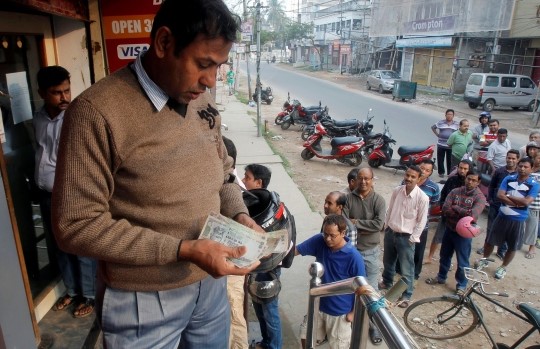Jayanta Dey/Reuters
By
Ananya S Guha
I am not an economist so I will not be able to critique the effects of demonetisation in India. Learned pundits including economists have given and are continuing to give their views.
Initially I thought that this would have a telling effect on those who evade income tax and stash away black money in their homes. The idea was to convert black to white under some compulsion and then to catch them napping with the help of income tax raids. They could deposit the cash piecemeal but to what extent? This seemed to be the master plan. Also it was surmised that huge quantities of fake currency were doing the rounds, hence replace the current five hundred and thousand rupee notes, and lay an embargo on the old notes until the new ones are printed.
The rest of course is history as these notes could not be printed in sufficient quantities and we had two thousand rupee notes which could not find their way in the market, as change was not available. Now what do people need to do? They need cash, need to make payments by cash or cheques, and they need to deposit money. As limits were put on taking out cash even by means of the ATM cash was obviously not in circulation. Depositing money was not a problem, but this also had its limits. The hawk eye was of course on the depositor. In between the small businesses had both the brains and the gumption to receive small amounts by Pay TM, etc. I admire their sense of presence of mind.
Then of course came the talk and babble of a cashless society, I think, an inept expression, because we are talking of direct cash transference adopting various means by credit cards, etc. A cashless society would imply a cash strapped economy and perhaps it is better not to bandy such expressions. What is meant is the rapid use of technology for monetary transactions, which is to take our societies more into a faster technological awakening. That is fine, but the counter argument is that the poor and the rural poor do not have access to such sophistication and finery. One has to make some study on this, because also at the rate of usage of mobile telephony this does not seem impossible.
Then of course were the sad stories of death, as a result of waiting in queues and suicides. A hundred deaths in this country can only cause grimaces – that is, nothing, could have been more! The Prime Minister’s silence on this matter has only made matters worse and exacerbated the shouting.
Now what is left to do? Have more notes, fill up the ATM corners so that the swiping can continue happily? Again some Banks had stopped accepting cheques, reducing the cheque book to an artefact or curio in a museum or an antique shop.
Let us get things clearly articulated. Of course the exercise had a definite purpose. Curb activities of black money holders and evaders of income tax. Two, get the fake currencies out of the market, so that good money drives out bad money, an old economic maxim or adage, hardly put into practice, at least in this country. Thirdly use technology so that we become ‘cashless’ in our transactions. Use all cards available so that we know who you are, what you are doing.
This entire issue of using technology gives a broad picture of the haves and have nots. What percentage of the Indian population has access to technology, the internet, the ATM? I believe questions of accessibility, availability comes into the fore here, similarly if we are making technological interventions for change in education. Maybe these will come in phases, the changes. But in our jump for radical changes, we are perhaps mistaking the proverbial wood for the trees. It all goes back to the basics: poverty, inequality, lack of education. Let us tackle these first by making innovative changes side by side, and give the black money holders and income tax evaders a bashing.
Technology also disrupts, has limitations, because of developmental reasons, inaccessibility and illiteracy. To make the rural poor, technology effectual is to impart education, and make them literate in terms of education and numeracy. Simply signing names is not literacy and certainly not education. Educational imperatives are first and foremost in a country which is not totally and comprehensibly literate. It is also a country where beggars, street hawkers (unfairly pushed out in many places, including Shillong), street children are ubiquitous. Education perforce holistically visualised with concomitant and imaginative use of technology will make our societies not so much cashless but liberated from demonised neglect, exploitation and oppression. If we put the cart before the horse we might be indulging in the legerdemain of inchoate word play. True we must get rid of endemic corruption, but corruption entails a gamut of forces: exploitative, oppressive and incendiary.
Where there is no feeling to uplift the weak and the poor in terms of social developmental processes, technology will only remain a white elephant and in the hands of a few possessive elites, who will complain inordinately about their poor salaries, but will use three cards for their mobiles, constantly changing numbers. The structures beneath, and their levels of deprivation are interminable.
They must be uppermost in our minds.



No Comments Yet!
You can be first to comment this post!